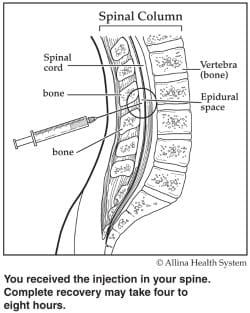
Care after anesthesia
Care after general anesthesia
General anesthesia is a medicine that puts you in a deep sleep. This means you will not feel anything during the surgery. Your anesthesia team is the anesthesiologist (doctor specializing in anesthesia) and certified registered nurse anesthetist.
Diet for adults and children
- Drink small amounts of clear liquids such as water, soda or apple juice.
- Avoid foods that are sweet, spicy or hard to digest for today only.
- Eat more foods as your body can tolerate.
- If you feel nauseated, rest your stomach for one hour, then try drinking a clear liquid.
Follow any instructions you receive from your surgeon.
Diet for infants
- Give your baby clear liquids (sugar water or juice).
- When your baby can drink water or juice, you can give him or her breast milk or formula.
Activity
- Please make sure a responsible adult is with you for at least 24 hours after surgery. The anesthesia may affect your judgment coordination and reaction time.
- Do not drive, operate heavy machinery or make any important or legal decisions for 12 to 24 hours after you leave the hospital or while you are taking a narcotic prescription pain medicine.
Medicine/discomfort
- Take your prescribed medicines as directed by your health care provider.
- Do not drink alcohol for 24 hours after you leave the hospital or while you are taking a prescription pain medicine.
When to call your health care provider
Call your health care provider if you have:
- nausea and vomiting that won't stop
- questions or concerns after surgery.
Care after local anesthesia
You have remained awake during your surgery. The medicine you received was injected directly into the surgery site. The medicine numbed the area so you didn't feel any pain during surgery. Depending on the medicine used, you may feel comfortable for several hours.
Activity
You may return to your normal home activities as directed by your health care provider.
Medicine/discomfort
If your health care provider ordered pain medicine, take it as prescribed.
Diet
You may resume your normal diet.
When to call your health care provider
Call your health care provider if you have any questions or concerns.
Care after spinal or epidural anesthesia
Spinal or epidural anesthesia is often used for surgeries of the lower body and legs.

The anesthesiologist injects medicine near the nerves in your back. This lets your surgeon perform the surgery while the lower half of your body is temporarily numb. Sedation to relax you is often given through your intravenous (IV) line.
Your anesthesia team includes the anesthesiologist (doctor of anesthesia) and certified registered nurse anesthetist.
When the effect of the medicine wears off, the part of your body which was numb will return to normal. Complete recovery may take four to eight hours. This will depend on which type of anesthesia was used.
You may be tender in your lower back where the injection was given. Please read the instructions you received when you left the hospital.
Diet
- Drink small amounts of clear liquids, such as water, soda or apple juice.
- Today, avoid foods that are sweet, spicy or hard to digest.
- Eat more foods as your body can tolerate.
- If you feel nauseated, do not eat or drink anything for one hour and then try drinking clear liquids.
Activity
- Please have a responsible adult stay with you for 12 hours after surgery.
- You will be transferred from a cart to a recliner after the feeling and strength return to your legs.
- Before you leave the hospital, you should be able to stand and walk a few steps.
- For the next 24 hours do not:
-
- drive a car
- operate machines.
- It is common to feel lightheaded and dizzy for the first 12 hours after your procedure. Change positions slowly from lying to sitting or standing.
Medicine/discomfort
- Take your prescribed medicines as directed by your doctor.
- Do not drink alcohol for 12 hours after you leave the hospital or while you are taking a prescription pain medicine.
When to call your doctor
Call your doctor if you have:
- unusual drainage or swelling at the injection site
- a headache that lasts longer than 24 hours
- any new numbness, tingling, weakness, changes in bladder or bowel function
- new back pain.
Whom to call with questions
If you have any questions or concerns, call your health care provider or the hospital Anesthesia Department.
Related resources